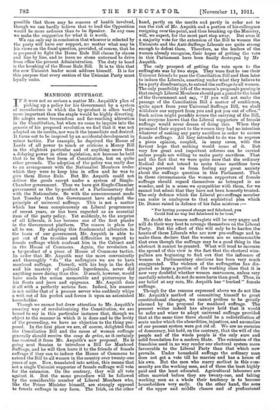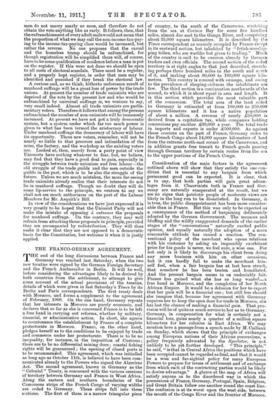MANHOOD SUFFRAGE.
IF it were not so serious a matter Mr. Asquith's plan of picking up a policy for his Government by a system of manufacture in which the by-product is often vastly more important than the staple would be highly diverting. He adopts some tremendous and far-reaching alteration in the Constitution, but when we come to inquire into the genesis of his proposed revolution we find that it was not adopted on its merits, nor was it the immediate end desired. It turns out to be inspired by an accidental development in minor tactics. For example, he deprived the House of Lords of all power to touch or criticise a Money Bill in the slightest particular and of anything more than a delaying power in other legislation, not because he held that to be the best form of Constitution, but on quite other grounds. The adoption of the policy was really due to an arrangement with the Nationalist Members under which they were to keep him in office and he was to give them Home Rule. But Mr. Asquith could not deliver the goods except under a system of Single- Chamber government. Thus we have got Single-Chamber government as the by-product of a Parliamentary deal with the Nationalists. So with the announcement made last Tuesday that the Government have adopted the principle of universal suffrage. This is not a matter which has been conspicuously on Liberal programmes of recent years, or has been regarded as an essential item of the party policy. Yet suddenly, to the surprise of all Liberals, it has become one of the first planks in the Government platform. The reason is plain for all to see. By adopting this fundamental alteration in the basis of our government, Mr. Asquith is able to get out of the troubles and difficulties in regard to female suffrage which confront him in the Cabinet and in the House of Commons. Again, the revolution is a by-product of a piece of House of Commons tactics. In order that Mr. Asquith may the more conveniently and thoroughly " do ' the suffragists we are to have manhood suffrage. Disraeli, with his leap in the dark and his mastery of political legerdemain, never did anything more daring than this. Disraeli, however, would have made the action memorable and picturesque by his flouts and jeers and epigrams. Mr. Asquith does it all with a perfectly serious face. Indeed, his manner is not unlike that of a process server who suddenly whips a writ out of his pocket and forces it upon an astonished householder.
Though we cannot but draw attention to Mr. Asquith's amazing way of revolutionizing the Constitution, we are bound to say in this particular instance that, though we object to the manner in which it is done and to the levity of the proceeding, we have no objection to the thing pro- posed. In the first place we are, of course, delighted that the Conciliation Bill and the cause of woman suffrage generally should receive the coup de grdce, as it certainly has received it from Mr. Asquith's new proposal. He is going next Session to introduce a Bill for Manhood Suffrage, and he will then leave it to the friends of female suffrage if they can to induce the House of Commons to extend the Bill. to all women in the country over twenty-one years of age. Now, translated into action, this means that not a single Unionist supporter of female suffrage will vote for the extension. On the contrary, they will all vote against it. But the same procedure will be followed by the considerable number of Liberal Members who, like the Prime Minister himself, are strongly opposed to female suffrage in any form. The Irish, on the other hand, partly on the merits and partly in order not to run the risk of Mr. Asquith and a portion of his colleagues resigning over the point, and thus breaking up the Ministry, will, we expect, for the most part stop away. But even if a majority vote for the extension of the Bill to women the Unionists and the Anti-Suffrage Liberals are quite strong enough to defeat them. Therefore, as the leaders of the women already recognize, their hopes of getting the vote in this Parliament have been finally destroyed by Mr Asquith.
The only prospect of getting the vote open to the suffragists was by two steps. They were first to use their Unionist friends to pass the Conciliation Bill and then later to induce the Liberals, smarting under what they believe to be a party disadvantage, to extend the suffrage to all women. The only possibility left of the women's proposals passing is that enough Liberal Members should put a pistol to the head of the Government and say, " If you will not make the passage of the Conciliation Bill a matter of confidence, quite apart from your Universal Suffrage Bill, we shall withdraw our support from you and put you out of office." Such action might possibly secure the carrying of the Bill, but everyone knows that the Liberal supporters of female suffrage would never dream of doing this. When they promised their support to the women they had no intention whatever of making any party sacrifices in order to secure female suffrage. All they intended to do was to express a pious opinion, coupled, in many cases, with the fervent hope that nothing would come of it. But very few great and important reforms can be carried unless people are willing to make party sacrifices. That and the fact that we were quite sure that the ordinary Radical did not intend to make those sacrifices have always prevented us from feeling any great anxiety about the suffrage question in. this Parliament. That in these circumstances the women supporters of female suffrage should regard themselves as betrayed is no wonder, and in a sense we sympathize with them, for we cannot but admit that they have not been honestly treated. The only defence which the Liberal pro-suffrage member can make is analogous to that sophistical plea which Dr. Donne raised in defence of his false mistress :— " For having purposed change and falsehood, you Could find no way but falsehood to be true.'
No doubt the women suffragists will be very angry and will do their very best to revenge themselves on the Liberal Party. But the effect of this will only be to harden the hearts of those Liberals who are now pro-suffrage and to make them declare that the women are so unreasonable that even though the suffrage may be a good thing in the abstract it cannot be granted. What will tend to increase the spread of this view is the fact that the electoral wire- pullers are beginning to find out that the influence of women in Parliamentary elections has been very much exaggerated. The violence of the suffragettes has dis- gusted so large a portion of the working class that it is now very doubtful whether women canvassers, unless very carefully selected, do not do more harm than good. Thus, in our belief at any rate, Mr. Asquith has " burked " female suffrage.
Though for the reasons expressed above we do not like Mr. Asquith's method of committing himself to great constitutional changes, we cannot profess to be greatly alarmed by the proposal for manhood suffrage. The present writer indeed has always held that it would be safer and wiser to adopt universal suffrage provided that at the same time there should be a redistribution of seats under which the absurdities, injustices, and anomalies of our present system were got rid of. We are no enemies of democracy, but hold, on the contrary, that the will of the people and of the whole people is the only sure and solid foundation for a modern State. The extension of the franchise need in no way render our electoral system more favourable to the Liberal Party than that which now prevails. Under household suffrage the ordinary man does not get a vote till he marries and has a house of his own. But the men who marry earliest in this com- munity are the working men, and of these the least highly paid and the least educated. Agricultural labourers are often married before they are twenty-one, and taking working men as a whole their tendency is to become householders very early. On the other hand, the sons of the upper and middle classes and of professional- men do not marry nearly so soon, and therefore do not obtain the vote anything like as early. It follows, then, that the enfranchisement of every adult male would not mean that the proportion of what we may call the non-income-tax-pay- ing to the income-tax-paying class would be increased, but rather the reverse. No one proposes that the casual and the homeless tramp should be enfranchised, for though registration will be simplified there will, of course, have to be some qualification of residence before a man is put on the register. If this were not done we should be open to all sorts of electoral scandals. There must be a register, and a properly kept register, in order that men may be identified and punished if they break the electoral law. A curious and, as we think, hitherto unforeseen result of manhood suffrage will be a great loss of power by the trade unions. At present the number of trade unionists who are deprived of the vote by the present law and who would be enfranchised by universal suffrage is, we venture to say, very small indeed. Almost all trade unionists are parlia- mentary voters. Therefore it follows that among the persons enfranchised the number of non-unionists will be immensely increased. At present we have not got a truly democratic system, but a system under which far too much power is given to what has been termed the aristocracy of labour. Under manhood suffrage the democracy of labour will have its opportunity. These new voters, remember, will not be nearly so liable to that pressure and intimidation of the mine, the factory, and the workshop as the existing voters are. Looked at, then, merely from a party point of view Unionists have nothing whatever to fear, but, we believe, may find that they have a good deal to gain, especially in the struggle between trade unionism and free labour—the old struggle of the trade guilds and the men outside the guilds in the past, which is to be also the struggle of the future. Unless we are much mistaken, the more far-seeing trade unionists already realize that their interests do not lie in manhood suffrage. Though no doubt they will do some lip-service to the principle, we venture to say we shall not see much enthusiasm on the part of the Labour Members for Mr. Asquith's Bill.
In view of the considerations we have just expressed it is very greatly to be hoped that the Unionist Party will not make the mistake of opposing a outrance the proposals for manhood suffrage. On the contrary, they may well refrain from attacking those proposals in principle, provided they are accompanied by redistribution. They will thus snake it clear that they are not opposed to a democratic basis for the Constitution, but welcome it when it is justly applied.



















































 Previous page
Previous page